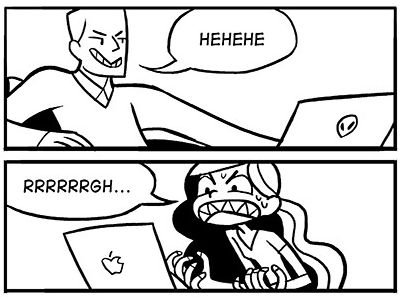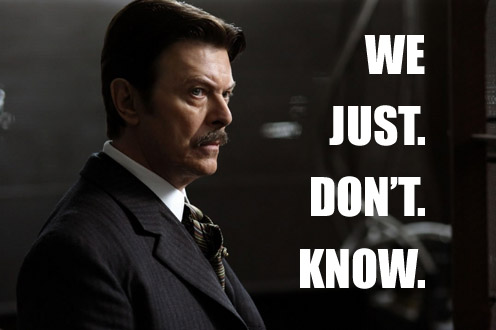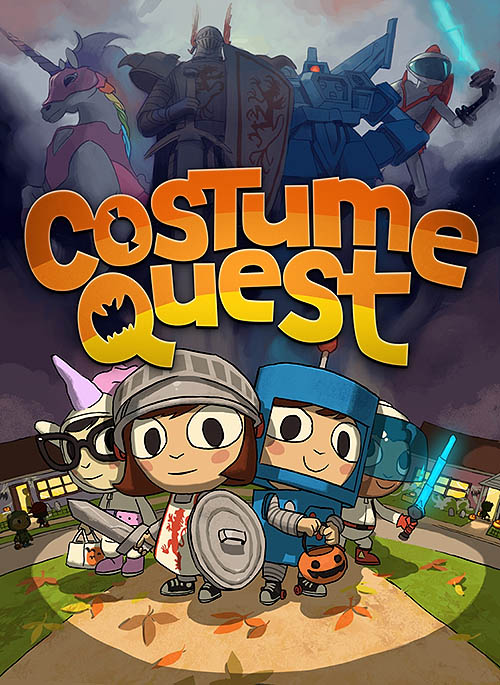Comics – Overreacting

Jemma Salume has an excellent series of comics about overreacting to things (and also learning to cook, and dating). They’re compact and hyperbolic, which is how I like my comics, and also how I like my toy universe model geometries, hahaha.
Music – Raiding the 20th Century
This remains my favourite mix, and with the ten-year anniversary upon us I was surprised to realise I had never put it in Things.
In 2004, DJ Food (aka Strictly Kev) made a 40-minute mix for XFM chronicling the history of ‘cut-up’ (essentially sample-based) music which he called ‘Raiding the 20th Century’. Shortly afterwards he read Paul Morley’s book ‘Words and Music’ which did much the same thing and covered much of the same material. Paul Morley also coined the phrase ‘Raiding the 20th Century’ twenty years earlier. Taking note of this big flashing fate-arrow, they got together, recorded Paul reading key parts of the book, and created a new hour-long mix of the material.
The mp3 is available over on archive.org, the track listing is here, and you can go ahead and listen to it right here:
https://www.youtube.com/watch?v=7GO5W6FRZPM
It’s about 20 minutes before the ‘history’ really starts, and while Morley’s commentary then explains and introduces many of the tracks and samples, many more are used without comment. Over the years, as I learn more about music history, more and more of them are making sense, which is very satisfying. As one of the samples used states: “every time you listen to this recording, something will happen.”
Links – Time and the Internet
As we build up an ever larger historical archive of material online, the date something was originally published becomes more important, and something we’ll need to become more aware of (assuming we avoid internet decay).
I like the approach of the BBC, which appears to maintain the CMS that articles originally appeared in (for example, this report from September 11th 2001, or the Mammal-of-the-month November 2002). That’s still not quite enough to avoid the confusion that may arise from incautious Googling for events that recur. Also, try to work out when this was written.
Anyway, if you would prefer a cogent discussion of the topic rather than a selection of semi-random BBC links, then I highly recommend Joanne McNeil’s piece on the subject here, in which she says things much more precisely than I have been, like this:
“Digital content appears with minimal visual language distinguishing yesterday from tomorrow and today. Now habits have emerged in which we communicate with the past and even mistake it for the present.”
(Also, see this Cat and Girl comic).
Video – Brett Domino
Looking through previous editions of Things, I was surprised to find I’d never featured Brett Domino, who does a range of silly-but-clever, bad-but-good things with music. I think the most impressive is his medley of the top 10 pop songs at the time he hit 10,000 Twitter followers, which culminates in a surprisingly effective montage finale:
Link – Scientific truth, researcher bias, and parapsychology
In a meta-analysis, the results of many similar experiments are analysed together in order to gain statistical power and shed more light on subtle phenomena. For example, if it’s a very small effect, some experiments won’t yield any results, perhaps causing us to question the experiments that do find an effect; by considering all these experiments together, we can better assess if we’re seeing Type I or Type II errors. Also, if you suspect the result may only come about due to sloppy methodology, you can see if there is a correlation between how ‘rigorous’ a study is and the size of any effect that it finds – if more rigorous studies come up with smaller effects, that’s quite suggestive.
Years ago I read about a meta-analysis of research into psychic abilities, and the results were not clear-cut one way or the other, despite taking a comprehensive overview of the relevant studies. I thought that was very interesting, because it suggested that either psychic abilities were real, or the scientific method wasn’t as infalliable as I had thought (or both).
Many more studies have been performed since, and this problem does not seem to go away. A strong clue seems to be the experimenter’s bias effect: a researcher who believes that an experiment will yield a certain outcome is more likely to end up getting that outcome, even if they are not intentionally manipulating the experiment to that end.
Of course, experimenter’s bias is quite a tricky and small effect to prove, so what you need to do is a meta-analysis across the various studies into it. But when different people conduct this meta-analysis, they reach different conclusions: some find the experimenter’s bias effect exists, and some find it doesn’t!
If you’ve been following closely to this point, you can guess the logical next step: we need a meta-meta-analysis of the experimenter’s bias meta-analyses, to see if meta-experimenters that believe the experimenter’s bias effect exists were more likely to find exactly that result in their meta-analysis! Brilliantly, and also alarmingly, this meta-meta-analysis was conducted and concluded that, yes, that’s exactly what happens: there is indeed a meta-experimenter’s bias effect. So the question now is… does the experimenter’s bias effect actually exist?

I found all this out from a brilliant essay by Scott Alexander, which includes all the juicy references and finishes with an amusingly modified Star Wars quote, so is pretty much perfect.
Puzzle – Sequel Naming
For some media, major new updates are numbered: movies (Iron Man 3), TV series (Game of Thrones Season 4), video games (Call of Duty 4) are obvious, but it’s also dominant in operating systems (Windows 8), Consoles/phones (Playstation 4, Samsung Galaxy S4) and even classical music (Bach’s Cantata No. 140),
Other things don’t seem to work that way, notably books (A Clash of Kings, rather than A Game of Thrones 2) and albums (Björk – Post, rather than Debut 2), but also theatrical productions (admittedly much rarer, but it’s Love Never Dies, rather than Phantom of the Opera 2)
(Of course, sometimes people mix their strategies with hilarious results: Call of Duty 4: Modern Warfare 2, BT Infinity 2, Xbox “One”)
The contrast is most stark in TV series versus books. So the question is this: why do we have Game of Thrones Season 2 on TV, but A Clash of Kings in book form?
Tim Mannveille tweets as @metatim, and previously worried about old things disappearing from the internet


